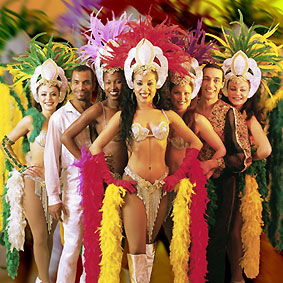Years back during my visit to Brazil I received a warm
red-carpet welcome, and it happened repeatedly. Well, I come from one of the
most racial countries in the world with foundations laid rigidly on religion
and castes. In Brazil, I am being well respected, admired, guided and
entertained by people around me, essential ingredients for surfing around. People
easily recognize me with my bizarre Portuguese accent or the Vibhuthi (the
sacred ash) on my forehead. Brazil is a country which embraces foreigners with
open hands, which is evident from the Christ the Redeemer.
Brazil is a truly multicultural (hybrid) country in
the world. It has 3 major racial stocks -
the American Indian, Negro and European white. An ideal recipe for harmony, a society
with mixed heritage and diversity. Racism is less visible or rather a petty
topic for discussion. It turns out to be a perfect place for humanity to
survive and share.
I have been observing recently! Most of the Brazilian magazines or the TV programs
whether it is a news channel or Novelas
( serials) are packed with white skinned models . If you switch on TV one
will notice what I am talking about, a display limited to white skins and
Brazilian Prados (Brown). I also noticed the limited presence of blacks at work
environment. These findings need to be seriously considered and evaluated.
Is Brazil a racial Paradise or racial haven?
Brazil was the last country to abolish slavery in the
new world (1888). It is home to the 2nd largest black
community in the world after Nigeria. Brazil has more blacks than in USA.
During the slavery period about 8 million Africans were brought into Brazil to
work in the plantations (Sugarcane and later to coffee) and mines. The slaves
were treated heinously and indifferently, but unlike USA they were later freed
or had the right to buy lands or save the other slaves. Also, the Portuguese men
mingled easily with African women and they openly accepted the fatherhood.
A renowned scholar of 20th century Gilberto Freyre in his book, says
" with respect to race relations the Brazilian situation is probably the
nearest approach to paradise to be found anywhere in the world"
After the abolishing of slavery, the government
administered a "whitening" policy by immigrating millions of Europeans.
A catalyst to an overwhelming exchange of colors and resulted in mixed heritage.
As on 2008, PNAD (Pesquisa
Nacional por Amostra de Domicílios) provides the following findings: 48.43% (white), 6.84% (Black), 43.80 %(Pardos/Brown), 0.58% (Asian), 0.28%(Indigenous) and 0.07% (Undeclared)
In the documentary "Brazil a racial paradise” by
Afro-American Professor Henry Louis Jr takes a one-step deeper observation on the
racial discrimination in Latin America. His excellent research brought explicit
information’s curtailing the racism in Brazil. He interviews famous artists,
activists and receives their version of criticism. Zezé Motta, the actor of the
famous 1976 Brazilian film "Xica da Silva", scorns "Her producer did not wanted to cast her in this film, because the
producer felt she was very ugly".
She adds "until recently
blacks were considered ugly". Abdias Nascimento, a civil rights legend
condemns that the governments propagated the message that blacks are treated
equal, which he thinks is a huge lie.
However, the changing governments has seriously
considered the situation and taken actions. Since 2001 more than 70 public
universities have installed racial admission quotas.
On the flip side the historians claims that racial
discrimination is relatively mild compared to the Brazilian epidemic called
social classes. Social Classes are
defined by social status, money, influence and so on. Brazil community basically
forms a pyramid structure, which is typically divided by segments (class A, B,
C, D, E, F). Bottom of the pyramid is
largely constituted by the black community mostly spread across the shanty
towns or inconvenient neighborhoods.
Interesting articles








Vadakkedath - as a Brazilian I'm glad to read that you feel good in my country. In fact, Brazil is our country just the way I'm sure you feel: stay at home!
ResponderExcluirBut, I'm not that sure if the racism is being driven to be abolished effectively. In 2013, we have a previous os 388 official years os black slavery (plus indians, but much less) and 127 official years in "freedom" and equality.
Of course you know that there is no equality and the best social position are still held in white hands. This is our terrible heritage still alive!
But it's not that clear that it is a kind of a racism. Because the racism in Brazil is sophisticated, it is under the words and over the acts. Check social numbers and see the truth. What is worst is that black people do not feel as capable as white people. Brazilian culture made them (us! I'm black) to feel small. Since always from Africa. We made up a newkind of slavery: the mental slavery.
I dream to build a better Brazil for everyone who decide to live in this blessed land. We do not have hurricanes, earthquakes, Vulcan nor even other terrible natural disaster. I truly believe our goal in building the best place in the world for living is something real: it's up to us. My basis: education, education, education.
I invite you and everyone who believes in the peace and freedom to help me in constructing the Paradise in Earth.